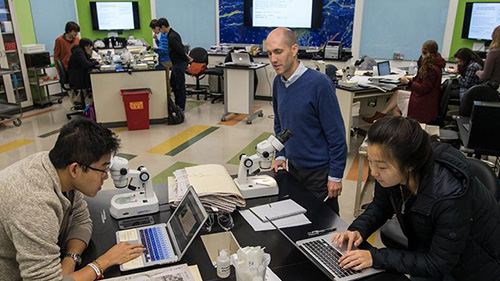Guidance
Graduate education and advising in EEB focuses on developing an individualized program of coursework and research that fosters students' development as successful, independent scientists in their chosen field. Advising for students begins with their primary advisor, and extends to members of their advisory and thesis committees. Upon joining the program each student chooses an advisory committee consisting of three or more faculty members. The advisory committee consults the student on recommended and required coursework, as well as possible teaching and research opportunities. By the end of the first year, students are encouraged to form a thesis committee of four faculty members that will guide the student through the remainder of the Ph.D. This committee provides guidance and evaluates the student's progress through regular meetings as well as the Qualifying Exam (typically in the second year) and the Thesis Defense. Yearly meetings of the entire graduate faculty in EEB also provide feedback and guidance to students.
Support
 Financial support for students comes from a variety of sources, including fellowships from the University, external fellowships (e.g., National Science Foundation, Department of Defense), and external research grants. All support includes a stipend and a waiver of tuition and fees. Summer support is provided by the graduate program and/or faculty research support. Prospective graduate students who are U. S. citizens are encouraged to apply for national fellowships that provide additional support.
Financial support for students comes from a variety of sources, including fellowships from the University, external fellowships (e.g., National Science Foundation, Department of Defense), and external research grants. All support includes a stipend and a waiver of tuition and fees. Summer support is provided by the graduate program and/or faculty research support. Prospective graduate students who are U. S. citizens are encouraged to apply for national fellowships that provide additional support.
Research
New students are encouraged to begin research projects as soon as possible. In some cases, an initial project develops into a thesis topic. Students will normally begin a research project by their second semester in residence.
Graduate students are expected to continue their research and training during the summer on campus, in the field, or at another laboratory. Although most students pursue summer research, some students also take advantage of advanced research courses offered in the summer at various research institutions around the country.
Course Work
There are no rigid course requirements. In the first year, students develop a plan of coursework in consultation with their advisory committee. By the end of the third semester, each student will be expected to have attained proficiency in his or her broad field of interest. Proficiencies may be demonstrated either through appropriate coursework or by examination. A grade of B or higher is required in all coursework taken for graduate credit.
In addition to the coursework, students are expected to participate in the program's graduate seminars. These seminars, taken for credit (Bio 243, 244), meet weekly during the academic year and focus on topics of current interest within the graduate program. Graduate Seminars in Ecology and Evolutionary Biology are specifically designed to address important topics for our students and constitute the focal point of the coursework within the program. Recent topics have included concepts in biomechanics, the biology of clonal organisms, quantitative genetics, pollination biology, systematics, plant ecological genetics, and sexual selection theory.
Students will normally register each semester for the maximum number of course or research credits until they have accumulated the number of credits necessary for the degree. For full-time students, this number is 4 for fellowship holders, 3 for teaching assistants. As most incoming Ph.D. students have some background in ecology and evolutionary biology, they are encouraged to supplement their training with course offerings in other biology departments, and in other departments outside of biology such as applied mathematics, biostatistics, computer science, engineering, geology, mathematics, etc.
Teaching
Financial support is not dependent upon teaching. All graduate students are required to teach for two terms in an undergraduate course as part of their professional development. The teaching requirement may be fulfilled only by assisting in courses in which graduate students conduct a discussion or laboratory section, and possibly present a small number of lectures.
Examinations
Qualifying examination. At an early stage in the Ph.D. program, normally not later than the end of the fourth semester, the student will take an oral qualifying examination. The primary purpose in the examination is to determine whether or not the student has the motivation, intellectual capacity, curiosity, educational background, and the technical skills necessary to pursue the Ph.D. program successfully. At least two weeks prior to this examination the student will submit a written thesis proposal to the thesis committee. This document will form the main basis for discussion in the examination, although there are no formal restrictions on the extent or range of questions asked of the candidate. The thesis committee consists of the thesis advisor and three additional members of the program faculty (or faculty of other graduate programs). A student who fails may be permitted to take a second examination, at the discretion of the thesis committee. If a student were to fail a second exam, they may be asked to leave the program. Once the qualifying exam is completed, the thesis committee will continue to guide the student through the completion of the Ph.D.
Thesis Defense
After completion of all designated work and submission of an acceptable thesis, the student will deliver an oral, public presentation followed by a defense to members of the thesis committee and other faculty members who choose to participate.